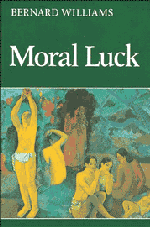Book contents
- Frontmatter
- Contents
- Preface
- Acknowledgements
- 1 Persons, character and morality
- 2 Moral luck
- 3 Utilitarianism and moral self-indulgence
- 4 Politics and moral character
- 5 Conflicts of values
- 6 Justice as a virtue
- 7 Rawls and Pascal's wager
- 8 Internal and external reasons
- 9 Ought and moral obligation
- 10 Practical necessity
- 11 The truth in relativism
- 12 Wittgenstein and idealism
- 13 Another time, another place, another person
13 - Another time, another place, another person
Published online by Cambridge University Press: 05 June 2012
- Frontmatter
- Contents
- Preface
- Acknowledgements
- 1 Persons, character and morality
- 2 Moral luck
- 3 Utilitarianism and moral self-indulgence
- 4 Politics and moral character
- 5 Conflicts of values
- 6 Justice as a virtue
- 7 Rawls and Pascal's wager
- 8 Internal and external reasons
- 9 Ought and moral obligation
- 10 Practical necessity
- 11 The truth in relativism
- 12 Wittgenstein and idealism
- 13 Another time, another place, another person
Summary
In Language, Truth and Logic Ayer proceeded on the basis that a sentence uttered by A on a given occasion, if it was to have empirical meaning, had to make a statement which was verifiable by A on that occasion, and this led to the well known reduction of statements about the past to statements about present evidence, and of third-personal statements about the mental to statements about observable behaviour. (Statements about the future, of course, are not strictly speaking verifiable at the time of utterance, but nevertheless were allowed to count, presumably because there is something that the utterer can start to do at the time of utterance which will, in principle, issue in verification – roughly, waiting and seeing.)
Later he moved to the position of saying that there is no class of statements which are statements about the past or about other minds, just as there is no class of statements which are statements about elsewhere. One and the same statement is made by one who speaks of a given event from a future, a present or a past perspective. An utterance using token-reflexive devices can be seen as doing two things at once: ‘by combining a description of the event in question with a reference to the temporal position of the speaker, the use of tenses brings together two pieces of information which are logically distinct’.
- Type
- Chapter
- Information
- Moral LuckPhilosophical Papers 1973–1980, pp. 164 - 173Publisher: Cambridge University PressPrint publication year: 1981



